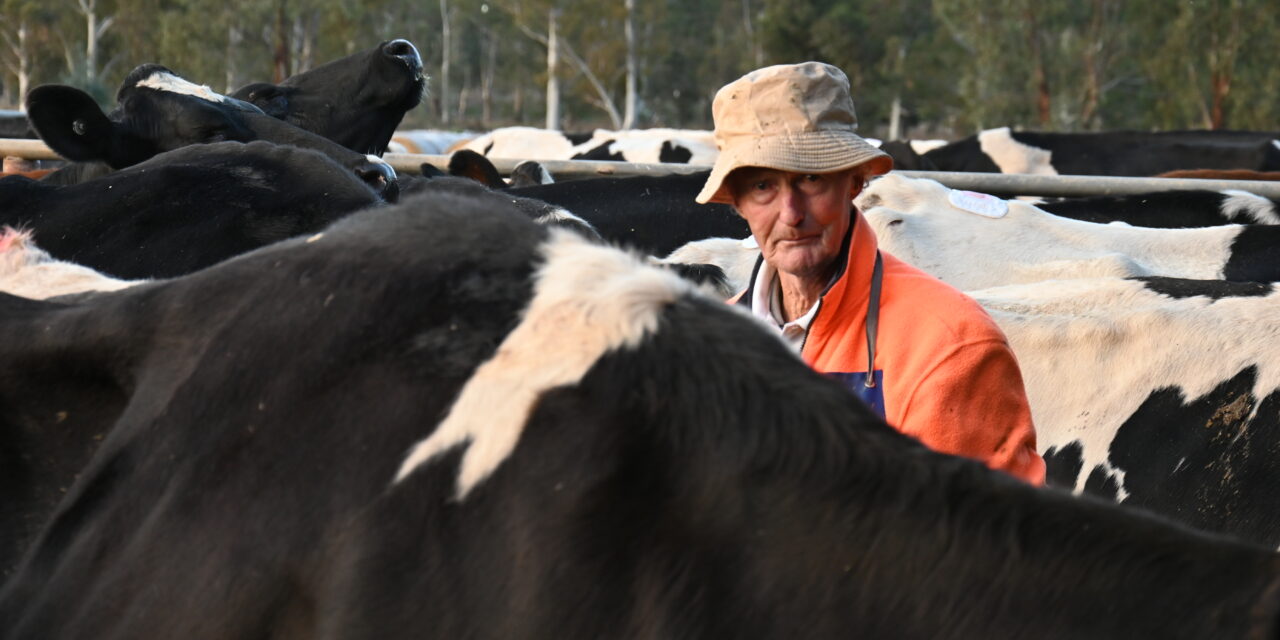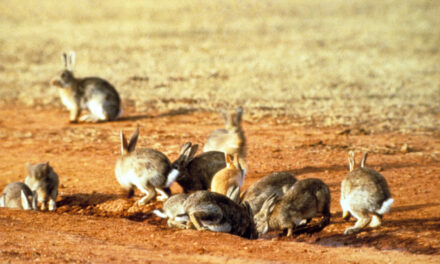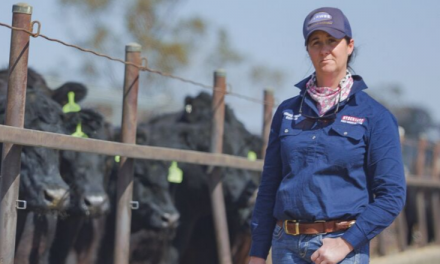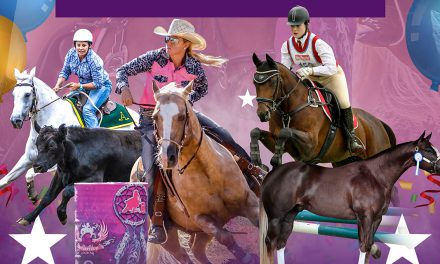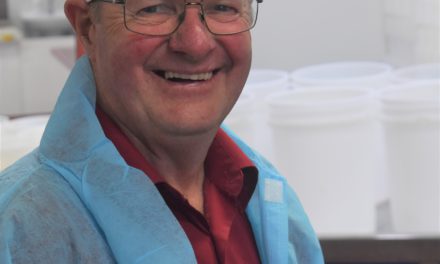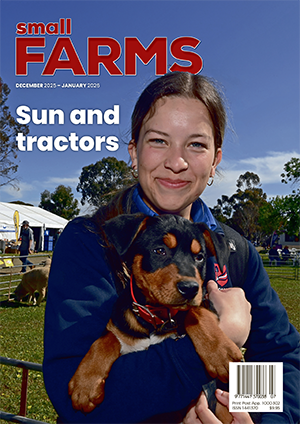The days might be passing by “jolly quick”, but Kerry Beattie still finds time for two of his great loves — milking cows and running. ANDY WILSON has the story.
“The commissioner said he would personally handcuff me to a telegraph pole.”
Notoriety can come in many forms but the story of Tasmania’s police commissioner telling the media he would personally chain someone to a telegraph pole is worthy of interest.
On any winter Saturday you will find Kerry Beattie on the clock and if you take a moment long enough, you will learn that time is a recurring feature in his life.
The 82-year-old time-keeping stalwart of the Merrigum Football and Netball Club in Victoria’s Goulburn Valley needs little prompting to open the door on his double life in the dairy industry and the world of professional runners.
“I don’t know where the time has gone,” Kerry said as half-time approached in the reserves game and the siren button was being eyed.
“It is amazing how jolly quick these days go by.
“As a kid, a year between birthdays took forever, but now a year is only a small percentage of your life.
“I said to my father — he was about 90 — you must be bored out of your mind your time goes so jolly slow.
“He said ‘oh no, the time flies past’.”
Half-time.
“Number 37 — that’s my son, Daniel.
“They all know how to run, all my children and my grandchildren.”
For the father of nine and grandfather of 20, that sounds quite an undertaking, but in knowing that most Wednesdays sees Kerry helping with the Little Athletics program at Kyabram P-12 School, you understand that this is a life not only well-lived but still thriving in his pursuit of fitness and fun.
“It’s very important to have a bit of fun and let your hair down occasionally,” Kerry said.
“If you can’t go out and laugh and have fun, then why bother doing anything?”
What Kerry has also had a lifetime of is running small dairies and Small Farms catches him in Victoria’s Kyvalley on the cups for an afternoon shift which he is sharing with his wife Rica, who occasionally helps him out.
There are two themes to take away from the ongoing story of Kerry Beattie.
Being on the ball and enjoying what you do is clearly prominent, and Kerry is not stopping.
Although we met to talk about his decorated running career, Kerry’s other passions take you on quite a journey.
He first worked in a dairy more than seven decades ago and has not ventured too far away from the vocation during his lifetime, in which he has seen much change.
“Breeding is by far the main change I have seen. The cows are producing so much now compared to years gone by,” he said.
“When I started out with my dad, each cow could produce about nine litres per day on average, and they have improved now to produce on average about 40 litres.
“And of course, all the electronics in the milking shed is a big help to everything.”
Kerry also sees the many advantages of running a small dairy, where the pastoral meshes well with the financial side.
“Take, for instance, that you have a large dairy and you’re milking 1000 cows. These businesses have got roughly one person per 100 cows, maybe not working all the time, and you might have a couple of calf rearers working full-time. Whereas with a small dairy, one person can milk 200 on their own, quite simply,” he said.
Kerry milks 350 cows in about three hours.
“Most of the smaller ones then get contractors to get their silage and hay,” he said.
“But the thing, of course, is to grow your own rather than buy it in, as it can be quite expensive.”
Kerry explained the economic difference between both types.
“The smaller operation has a much larger margin to work on, so if you have, let’s say a 10 per cent price reduction on 100 cows, then it’s not as bad as than if you were a larger operation with the same fall.
“There is plenty of money to be made with a larger farm, sure, but a 10 per cent reduction can be a massive hit, whereas the smaller farmer won’t be able to get that new tractor and be content with driving the old one.”
Having milked in Queensland, he speaks as ‘gospel truth’ the difference in prices for milk solids.
“There is a tremendous difference, an almighty difference,” he said.
“Take that our milk price here has gone to about $8 per kilo of solids. In Queensland it is $15 and that’s a massive difference.
“To produce the milk up there will cost a wee bit extra because you need to treat them different and with ticks and maybe higher fences.
“Queensland is the state to be milking in, there’s no doubt.”
Kerry said a well-known production company found the difference big enough to drive tankers full of Victorian milk up to north Queensland.
“There would be an awful lot of margin to be able to afford that — the tankers, the fuel and several drivers,” he said.
“If you were a dairy farmer in Queensland and you had a reasonable set-up, you’d be grinning.”
The other half of Kerry’s story is running, and he enjoys taking Tuesdays off to do handicap-staggered hill sprints with his son Daniel and any grandchildren who care to join in.
It is an activity he has enjoyed for decades.
As a professional runner in the 1960s, Kerry was winning events all over the nation, famously pushing through a major calf injury around Brisbane’s St Lucia circuit to pull away from some serious contenders.
“My calf had turned black from the injury, and I could hear the others catching up, but I pushed on and finally got away from them — I ran through the pain,” he said.
“The other bloke complained that I should have retired.”
In 1967, Kerry broke the 30-mile world record for a professional runner between Burnie and Devonport, then nearly two decades later returned to shave another 19 minutes from it at the age of 44.
Which brings the story to 1973, when he was famously threatened with being handcuffed to a power pole by Tasmania’s police commissioner when he planned to make the first known run along the island’s now-famous Overland Track, long before it had boardwalks and over-charged tourists.
“I did a trial run out for a few hours to see what it was like,” Kerry said.
“The walking group said it couldn’t be done, and that just motivated me more.
“They all said I was crazy.”
He pulled it off.
Kerry has also had a few brushes in his time.
He fell into a bog up to his neck on that infamous Overland run. To get out, he simply took his time for his heart rate to come back down before thinking his way out.
“I was really annoyed because it added a jolly hour to my time.”
On an uphill ‘reconnaissance’ run to Cradle Mountain he went into a sleep-like trance.
With a few kilometres to go to reach the base of the mountain, he enraged a bus driver sitting on his tail despite non-stop blaring of his horn.
“There’s this fella with his hand on the horn. I honestly did not know,” Kerry explained.
“It sounded like a noise just inside my head — I was that focused.”
And if dealing calmly with a co-worker coming at him with a knife on an asparagus farm was not enough, a 0.22 calibre bullet zipping past his ear on another run into Burnie told this cat that nine lives might just be enough.
“I heard the whizz of the bullet and felt the air brush past me,” Kerry said.
“I looked back and saw a curtain move in a house.
“At first the cop came back and said it was nothing, but I insisted and, well, in the end it was a lad at home alone while his parents were at work.
“They were both teachers and so, after I had thought about it for a while, I figured they were going to do the right thing in setting that boy right, so I didn’t take it further.
“I don’t think time in jail for him would do him any good at all.”
Kerry now milks nine shifts a week.
“Nothing’s difficult about cows. You must not take anything too seriously and even if there’s an issue, you just got to do what needs doing,” he said.
Kerry said the health of any herd was an ongoing job.
“Every milk you’ve got to watch all of them and be right on the ball,” he said.
“If their health is a bit off or you have any problems, the milk factory will let you know, so we get it right all the time.”
Currently the farm is joining the cows and Kerry says he’s not bad on the maternity side of things.
“But to make it easier, she lets you know when she’s going to calve,” he said.
“And quite often I have some midwifery duties, because if you wait, you’re not going to be able to do anything and if you lose her, well that’s $4000 of production lost.”
Farming is in the blood and Daniel manages a 600-hectare dairy farm at Merrigum. But he looks forward to Tuesdays when he, his wife Rachael and their three young children make the trip to Shepparton’s Botanical Gardens for their weekly race.
“Daniel says every day he gets off ‘I’m going to see Dad’,” Rachael said.
“We do this most weeks.
“Then we go to MacDonald’s for a reward.”
Kerry and Rica once retired to Queensland, but it didn’t last long. After some relief milking for a few dairies, they decided to come back closer to the family.
Rachael lets me in on a secret about the return.
“He got bored,” she said of Kerry.
“Then once he met his granddaughter, there was no keeping him away.”
The three generations of Beatties all start in a handicap formation at various distances on the uphill zigzag path and all three finish within a split second of each other.
Rachael beams at her little boy keeping up with his father while his grandfather barrels uphill behind them.
Kerry has recently taken to golf with family and friends and claims that having done a lot of running through fairways all his life, he’s only seen one bloke smiling on a fairway.
“Why bother playing?” he said.
He also takes growing broccoli and Brussels sprouts quite seriously.
And he still takes his chances, be they more genteel, with his trips to Melbourne’s Crown Casino paying off at the roulette wheel.
Kerry does not put it down to luck, either: he has a practice wheel at home.
“I worked it all out here on my table where I have maybe 250 different types of strategies,” he said.
“They all work some of the time but none of them work all of the time.
“You’ve got to know what’s happening — you don’t just win-win-win-win.”
As the Beatties depart the gardens, there is a mystique that lingers when I chat to another runner taking over the path.
“I know that bloke,” he says quietly.
I ask how.
“I used to chase him up hills in races years ago. He doesn’t remember me, but I sure remember him.”
Time on his side
